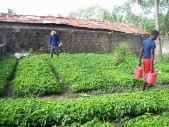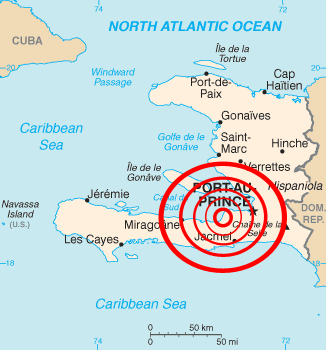January’s earthquake changed everything. With the country’s infrastructure destroyed and Haitians worrying how they were going to survive in the dusty, crumbling aftermath, Bel Soley’s goal seemed like a distant dream. Port au Prince, the only major debarkation point for exports out of Haiti, had been reduced to little more than rubble. But Hays and his team refused to abandon an important source of capital for their local farmers.
It had always been a part of their business plan to make “a good quality and truly uniquely Haitian pepper sauce,” said Hays. So, with no other avenues for the company to pursue, Bel Soley accelerated their plans and embarked on creating a pepper sauce that could be grown and sold domestically and used for export.
 The key to their pepper sauce is a small pepper called Piman Bouk (goat pepper), a cross between the ever-popular habanero and scotch bonnet peppers. The red, yellow, orange, and green Piman Bouk peppers are native to the island of Haiti and have been harvested for hundreds of years. With a distinct tangy flavor and a robust 124,000 Scoville Heat Units, the peppers seemed to be the perfect base for a true Haitian hot sauce.
The key to their pepper sauce is a small pepper called Piman Bouk (goat pepper), a cross between the ever-popular habanero and scotch bonnet peppers. The red, yellow, orange, and green Piman Bouk peppers are native to the island of Haiti and have been harvested for hundreds of years. With a distinct tangy flavor and a robust 124,000 Scoville Heat Units, the peppers seemed to be the perfect base for a true Haitian hot sauce.
“All the pepper sauce sold in Haiti now is either Tabasco or Louisiana Hot Sauce,” Hays explained. “We know there is a good domestic market and with something different and of good quality, there should be an export market as well.”
 Bel Soley agronomists—scientists who specialize in soil quality, land cultivation, and crop production—distribute nursery-grown “starter” pepper plants to ¼ – ½ acre family owned farms. Bel Soley provides training to the farmers and monitors water quality, crop rotation and other production methods to manage quality control.
Bel Soley agronomists—scientists who specialize in soil quality, land cultivation, and crop production—distribute nursery-grown “starter” pepper plants to ¼ – ½ acre family owned farms. Bel Soley provides training to the farmers and monitors water quality, crop rotation and other production methods to manage quality control.
“The Haitian farmers who grow organic produce for the program no longer rely on charity but participate in a basic, sustainable economic development program,” said Haitian-American Jean-Patrick Lucien, Bel Soley co-founder and Chief Executive Officer. “This enables hundreds of small farmers, families and entrepreneurs with the opportunity to participate in a financially successful export market,” Lucien adds.
Return to Top





